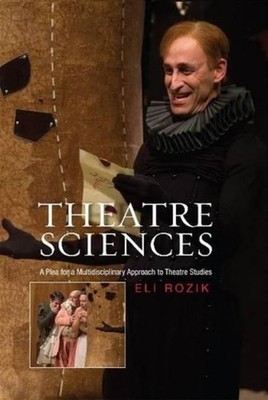
- We will send in 10–14 business days.
- Author: Eli Rozik
- Publisher: Sussex Academic Press
- ISBN-10: 1845197259
- ISBN-13: 9781845197254
- Format: 12.4 x 25.9 x 2.1 cm, minkšti viršeliai
- Language: English
- SAVE -10% with code: EXTRA
Reviews
Description
Traditional theatre semiotics promoted a scientific approach to theatre studies, albeit viewing semiotics as the unique discipline of research.Theatre Sciences: A Plea for a Multidisciplinary Approach to Theatre Studies;suggests instead a multi-disciplinary approach, including the following theoretical disciplines: narratology, mythology, pragmatics, ethics, theatre irony, theory of genres, aesthetics, semiotics, theory of nonverbal figures of speech, rhetoric, psychoanalysis, reception theory, history, and sociology with semiotics being only one among equals. These disciplines are presented from the perspective of their possible contributions to a sound methodology of theatre-texts analysis. Traditional theatre semiotics, moreover, holds the view that the actual performance on stage is the genuine text of theatre, instead of the play-script. Despite this paradigmatic shift, however, this viewpoint has failed to produce commendable analyses of such texts. The alternative presupposition put forward in this volume entails a series of novel perceptions of the theatre-text and its possible impact on the experiencing spectator, whose role in reading, interpreting and experiencing the theatre-text is not less crucial than that of the text itself. This view presupposes that the theatre-text is a description of a fictional world generated by the theatre medium. The author also contests the age-old view that a theatre/fictional-text reflects a simple narrative structure, and suggests instead a complexity that consists of seven layers: personified, mythical, praxical, nave, ironic, modal and aesthetic with each one of them re-structuring the previous layer. Prof. Rozik also presents and describes a semiotic layer that lends communicative capacity to the description of a fictional world, and two additional metaphoric and rhetoric layers, which structure the theatre experience. The underlying purpose is to illustrate the application of the aforementioned disciplines to these fictional layers, and eventually their joint application to entire theatre/fictional texts. Organization of the book reflects the structure of a university course.
EXTRA 10 % discount with code: EXTRA
The promotion ends in 22d.23:05:25
The discount code is valid when purchasing from 10 €. Discounts do not stack.
- Author: Eli Rozik
- Publisher: Sussex Academic Press
- ISBN-10: 1845197259
- ISBN-13: 9781845197254
- Format: 12.4 x 25.9 x 2.1 cm, minkšti viršeliai
- Language: English English
Traditional theatre semiotics promoted a scientific approach to theatre studies, albeit viewing semiotics as the unique discipline of research.Theatre Sciences: A Plea for a Multidisciplinary Approach to Theatre Studies;suggests instead a multi-disciplinary approach, including the following theoretical disciplines: narratology, mythology, pragmatics, ethics, theatre irony, theory of genres, aesthetics, semiotics, theory of nonverbal figures of speech, rhetoric, psychoanalysis, reception theory, history, and sociology with semiotics being only one among equals. These disciplines are presented from the perspective of their possible contributions to a sound methodology of theatre-texts analysis. Traditional theatre semiotics, moreover, holds the view that the actual performance on stage is the genuine text of theatre, instead of the play-script. Despite this paradigmatic shift, however, this viewpoint has failed to produce commendable analyses of such texts. The alternative presupposition put forward in this volume entails a series of novel perceptions of the theatre-text and its possible impact on the experiencing spectator, whose role in reading, interpreting and experiencing the theatre-text is not less crucial than that of the text itself. This view presupposes that the theatre-text is a description of a fictional world generated by the theatre medium. The author also contests the age-old view that a theatre/fictional-text reflects a simple narrative structure, and suggests instead a complexity that consists of seven layers: personified, mythical, praxical, nave, ironic, modal and aesthetic with each one of them re-structuring the previous layer. Prof. Rozik also presents and describes a semiotic layer that lends communicative capacity to the description of a fictional world, and two additional metaphoric and rhetoric layers, which structure the theatre experience. The underlying purpose is to illustrate the application of the aforementioned disciplines to these fictional layers, and eventually their joint application to entire theatre/fictional texts. Organization of the book reflects the structure of a university course.


Reviews